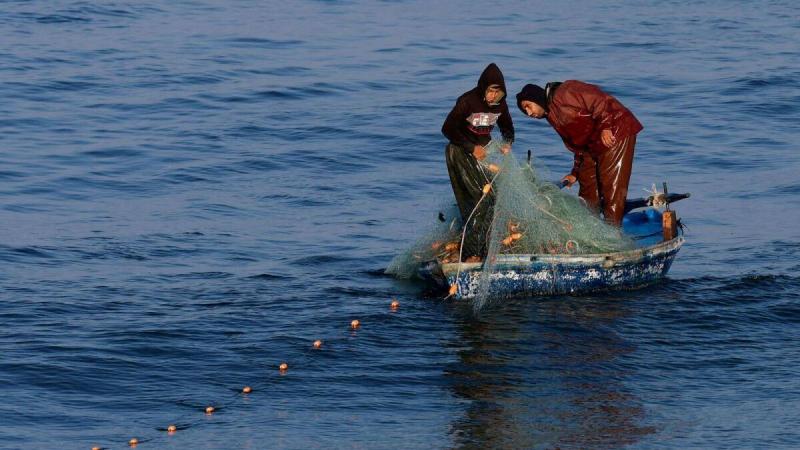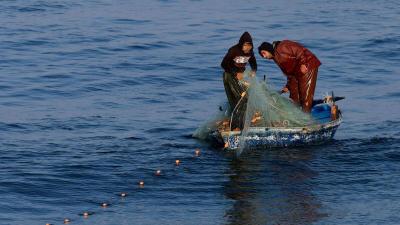Gaza fisherman Abdul Rahim Najjar risks his life every day as he paddles a small boat through waves under Israeli military surveillance, occasionally catching small amounts of crabs and fish to feed his hungry family. Fishermen in the small Palestinian enclave have long been subjected to a strict Israeli ban on the distance they can fish, but since the war began, none have dared to venture more than about 100 meters from the shore.
The Israeli war, blockade, and bombardment over the past three months have pushed the Hamas-run Gaza Strip to the brink of famine, with United Nations assessments indicating that residents are at risk of starvation. For fishermen, who can barely navigate the initial waves in the Mediterranean and cannot reach deeper waters where larger quantities of fish are located, any catch has now become vital for sustaining their lives and those of their families.
Najjar, sitting on the beach holding a lone skinny crab he pulled from his net, said, "This is what we catch. Very little, very little. We go just 100 meters, very little, this is the catch. Do you see? We can hardly feed our children."
Little girls sat watching Najjar as he worked, searching for scraps in the nets while he sorted them and hung them up to dry. Before the war, fishermen would use motors on their small boats and could venture several kilometers off the Gaza coast. Now, they paddle in pairs, one rowing while the other stands to throw the nets.
He added that when they go beyond 100 meters, Israeli forces sometimes fire shells at them to force them back to shore, citing increasing security concerns linked to the war. Ibrahim Najjar, Abdul Rahim's brother and his fishing partner, said, "This feeds five families, not just one or two. Despite what we're going through, we still want to fish; we want to live."
The dire need for food drives fishermen to face shelling in exchange for this meager reward, evident in the city of Rafah, where people lined up outside a charity kitchen. Children stood with grim faces, waiting for tiny portions of lentils or pasta.
Mohamed Shindghli, one of the displaced, said at the kitchen, "Our bodies are collapsing due to food shortages. My children are sick from lack of food. This is not enough. It barely suffices for two, and we have to feed seven. It’s not even one meal."
The Israeli attack on Gaza has resulted in over 24,280 deaths, according to health authorities in the enclave, and has displaced most of the 2.3 million residents from their homes. Israel pledged to eliminate Hamas after militants from the group killed over 1,200 people and took 240 hostages during a surprise attack on towns in southern Israel on October 7.
A UN-backed report stated that Gazans are facing acute hunger levels, with the risk of famine increasing daily. Recent footage has shown clashes as hundreds rushed in the city of Gaza to deliver rare supplies of flour. In the charity kitchen, a woman known as Umm Mustafa said she arrived too late, and the food ran out when she reached the front of the long line.
"I don’t know what I will feed my children. My father is elderly and suffers from heart disease. The schools only offer a bottle of water and two biscuits," she said.




